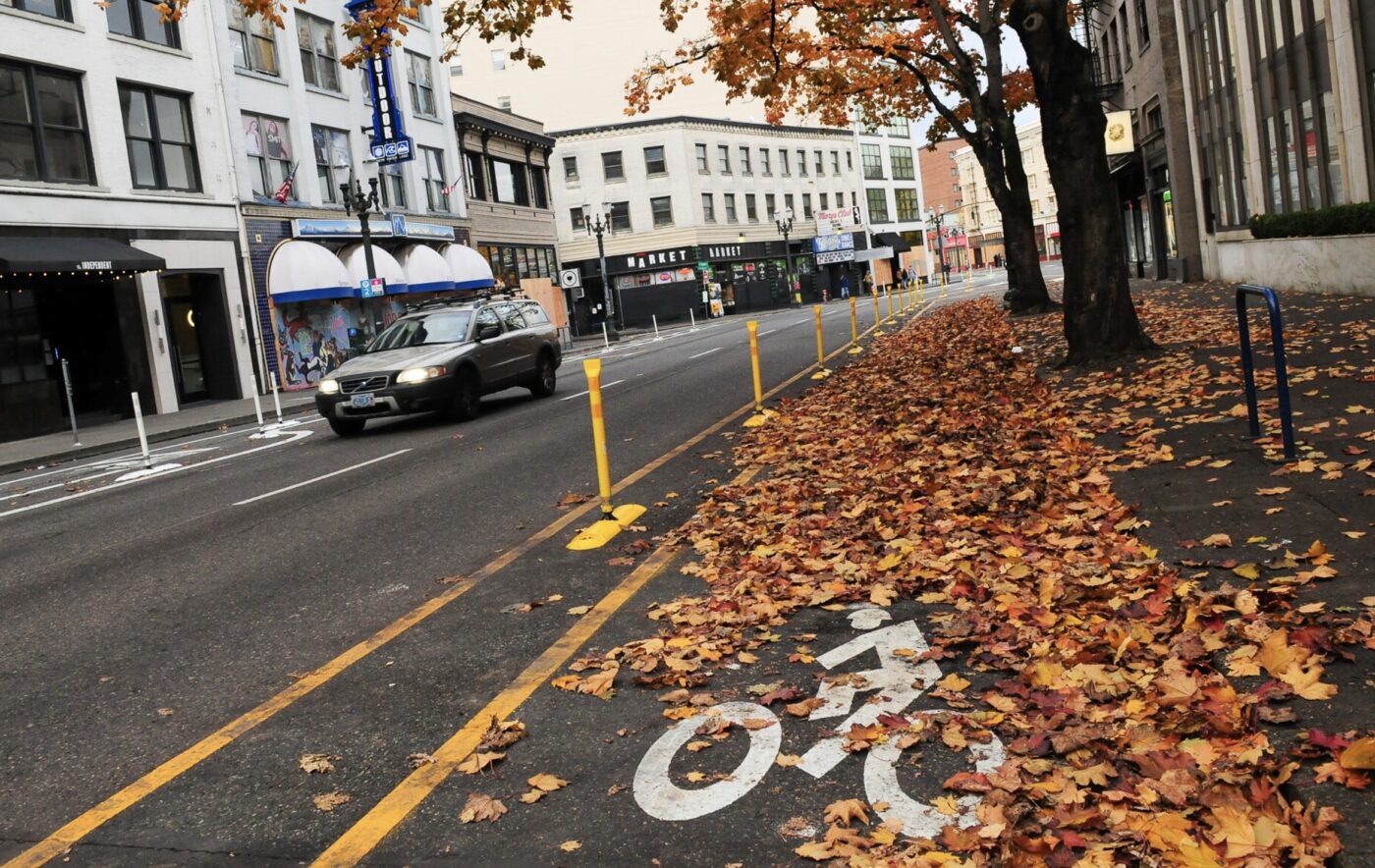
It’s been a roller-coaster week for the Portland Bureau of Transportation (PBOT). On Tuesday they announced controversial plans to remove a new bike lane, and on Wednesday we learned a judge ruled against them in a lawsuit that could expose the city to major liability for not complying with the Oregon Bike Bill.
But also yesterday there was very, very good news: City Commissioner Carmen Rubio announced a plan that would inject $112 million into PBOT as part of $540 million in unanticipated revenue from the city’s Clean Energy Surcharge (CES), a 1% tax on retail gross revenue earned within Portland on tax filers with a total gross income of $1 billion or more, and a Portland gross income of $500,000 or more. The CES is the revenue source for the Portland Clean Energy Fund (which Rubio oversees as commissioner-in-charge of the Bureau of Planning & Sustainability) which was created to fund projects and programs that help low-income and people of color fight climate change.
The funds pegged for PBOT would be spread over five years and would be used to: buy new streetcars, sweep bike lanes, build small bike/walk/transit projects, continue community programs like Safe Routes to School and Sunday Parkways, and purchase LED streetlights. This funding would be in addition to the $20 million PBOT received from the PCEF Capital Investment Plan passed by City Council in September.
The largesse is possible because forecasted revenue from the CES is expected to be $540 million over initial estimates. The City Budget Office chalked up the higher forecast to a strong retail sales growth trend, weakening inflation, and more e-commerce sales which tend to be concentrated in corporations that pay the tax.
The funding for PBOT could not come at a better time. The bureau’s finances are floundering as agency leaders plan a cut of $32 million (one-third) from their already-dwindling annual discretionary funds. PBOT’s budget has been battered for years by a loss of revenue from parking fees, limitations from the State Highway Fund, and inflation that has driven projects costs way up. Pandemic-related shifts in travel behavior would be the nail in the coffin if PBOT doesn’t find some sort of lifeline.
“This funding will help PBOT fulfill a key priority of our bureau, the city, and PCEF: making low-carbon travel options safe, accessible, and convenient for all Portlanders,” PBOT Communications Director Hannah Schafer shared in an email to BikePortland this morning. “We are currently assessing how this will impact our overall budget shortfall. We anticipate this funding will help us keep jobs and programs that otherwise would have been cut.”
Below are the five PBOT projects that would receive funding (taken from document shared by Rubio’s office). Keep in mind these figures are spread over five years:
Streetcar Capital Replacement – $30 million: Replacement of the Portland Streetcar fleet to ensure continued operation, affordable and efficient service. Continued operation of transit system that carries over 9,000 passengers per day, including high percentage of priority populations. Thirty-nine percent of all affordable housing in Portland is directly on the Streetcar line.
Active Transportation Operations – $10 million: Sweep and maintain almost 400 miles of bike lanes, approximately 6 times annually. Direct benefit to people using active transportation in providing safe, clean and accessible bike lanes to use throughout the year.
Small Active Transportation Capital Investment Program – $20 million:Deployment of small capital projects that complete biking and walking networks and make transit work better, providing community members with safe, convenient ways to get around while reducing greenhouse gas emissions. Prioritized benefit in building projects in areas that are identified as equity areas using PBOT’s equity matrix. Projects come from plans prepared in partnership with community and allow City to deliver on commitments made in those processes.
Community Programming, Education and Encouragement – $15 million: Continued community programs including Sunday Parkways, Safe Routes to School, bike, pedestrian and neighborhood greenway system coordination and outreach, citywide climate mobility encouragement. Programs use PBOT’s Equity Matrix to determine program focus areas, and also include funding for community partner organizations. Direct benefit to over 100 schools, making it safe, convenient and fun for children of all abilities to bicycle, walk, and roll to school and around their neighborhoods. Sunday Parkways events deliver community benefits throughout Portland, providing a safe, car free space for people to walk, bike and roll.
LED Streetlights – $37 million: Support conversion and installation of LED streetlights and associated green energy costs. Indirect benefits of better illumination & safety in neighborhoods.
This $112 million for PBOT is a portion of $282 million spread across five other bureaus. A second tranche of $258 million will go toward five specific projects that includes $100 million for production of “green affordable housing”, $100 million for protection and maintenance of 240,000 street trees, and other clean energy projects.
Rubio’s plan must still jump a few hurdles before it becomes official. The PCEF Committee will weigh in on it at their next meeting in January. The committee will then make a recommendation to Portland City Council who will have the last word before it’s fully adopted. The timing of a final council vote could be around when Rubio announces her mayoral candidacy — a decision that could influence this funding plan because two of her colleagues on council, Rene Gonzalez and Mingus Mapps, are already campaigning for that job.


